
1327 East 75th Avenue • Anchorage, AK 99518
phone 907.336.3617 • fax 907.336.3616
email nccountertops@gmail.com

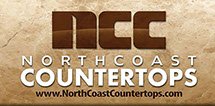
KITCHEN PLANNING GUIDE
North Coast Countertops offers a variety of educational tools to help you choose the best stone options for your home or office, as well as learn more about our company and process.
Visit the following pages to learn more!
•
•
•
•
•
Countertop Fabrication Process
•
A Guide to
Kitchen Island Designs & Layouts
NORTH COAST COUNTERTOPS IN ANCHORAGE, ALASKA
KITCHEN PLANNING GUIDE
Countertop Guides & Articles
Countertop Comparison, FINDING THE RIGHT SURFACE
Can't decide which countertop surface is best for you? Well, that is not surprising considering the numerous countertop surfaces available. North Coast Countertops takes pride in helping you find a stylish surface that resists stains, scratches and spills and fits your budget! Call and talk with one of our highly skilled and trained experts today.
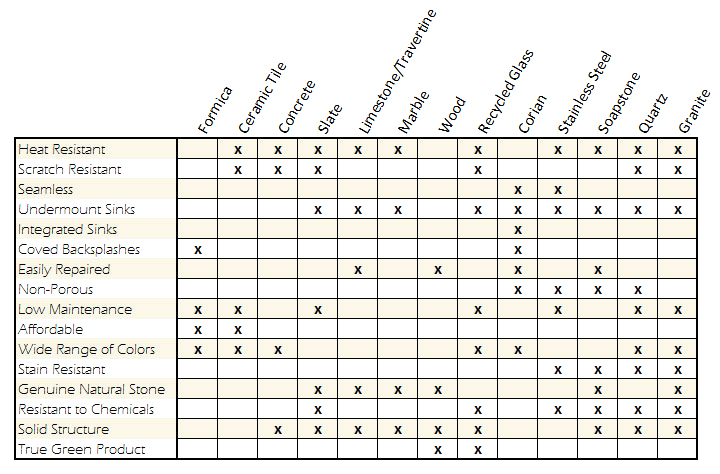
Choosing a countertop for your kitchen or bath can be difficult with so many options to choose from. Download our Consumer Reports Countertop Comparisons Report as a guide to help you pick what’s right for your situation. Our specialists and projects managers are here to help as well. Please contact us with any questions or visit our Countertop FAQ’s for more helpful information.
Starting a kitchen remodel? New construction? Need to select a surface but not sure what countertop options suit your needs? Don’t know what’s in your budget? Use our professional countertop estimation guide to help you obtain an accurate estimate for your remodel project.
Or maybe you need some help selecting the best island layout for your kitchen.
CONSUMER REPORTS COUNTERTOP COMPARISONS REPORT pg. 1
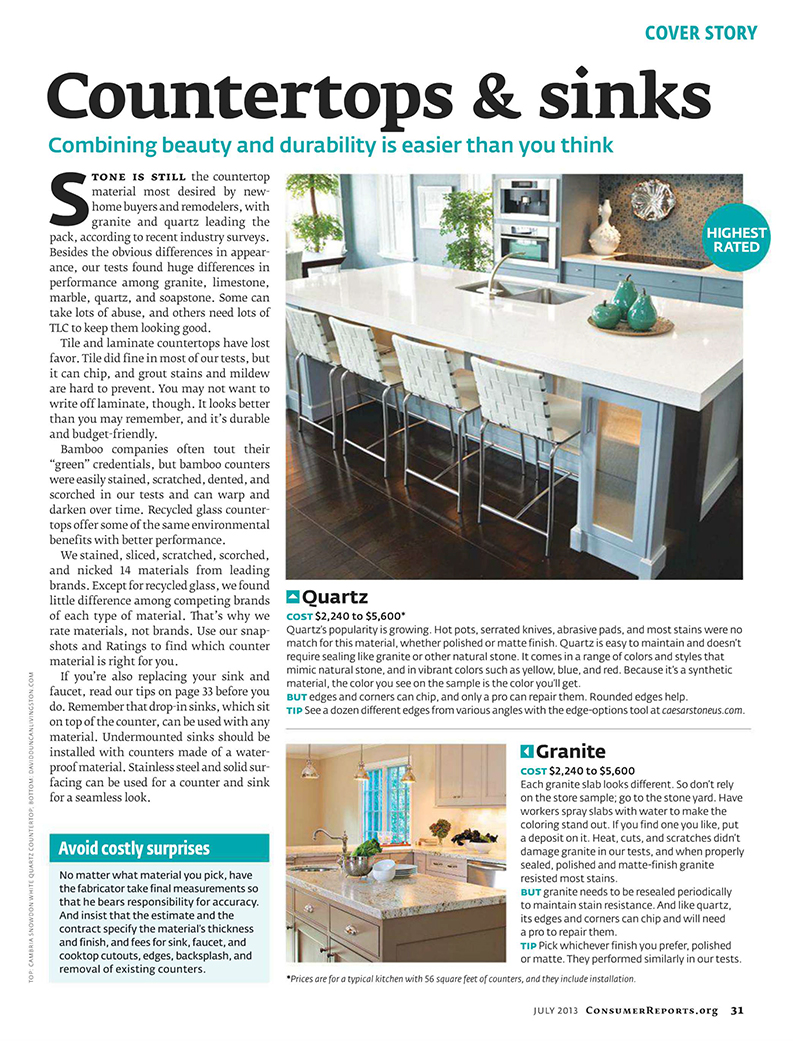
CONSUMER REPORTS COUNTERTOP COMPARISONS REPORT pg. 2
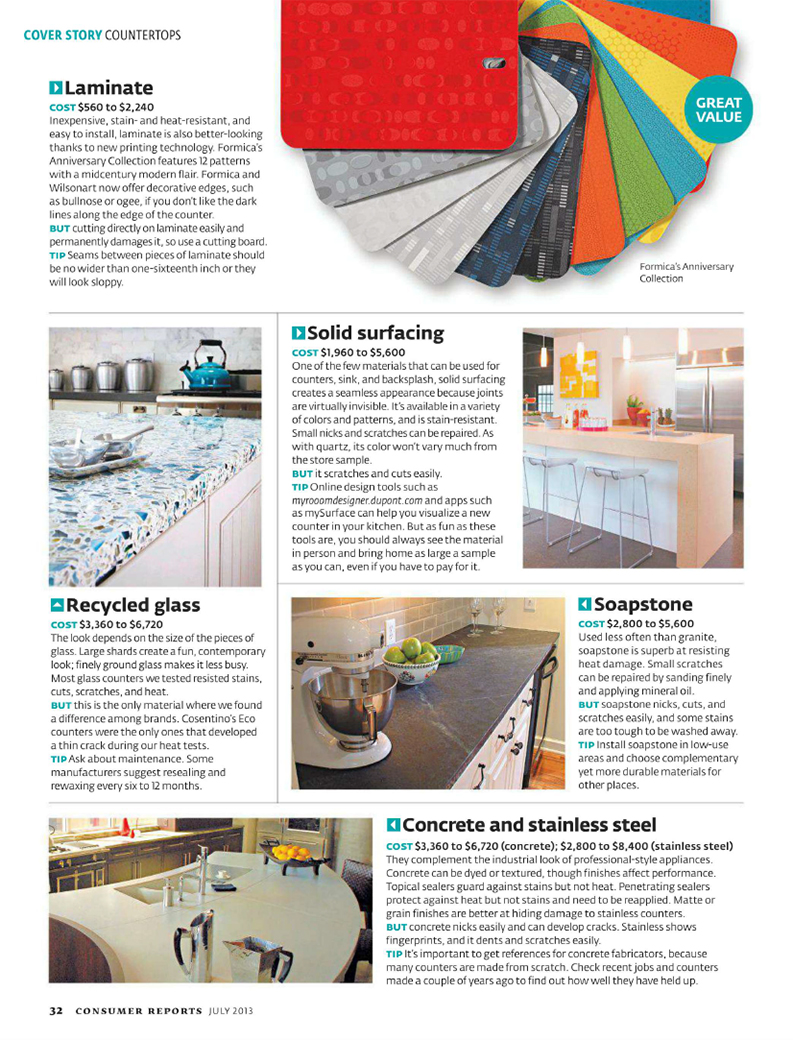
CONSUMER REPORTS COUNTERTOP COMPARISONS REPORT pg. 3
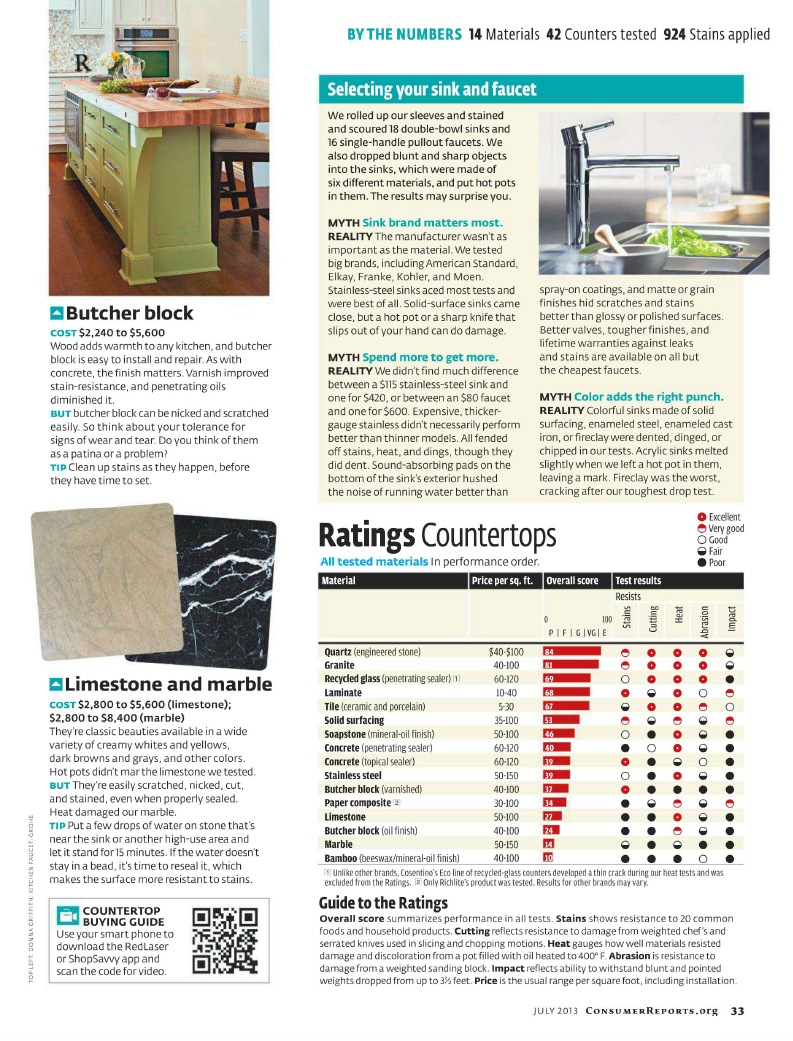
GRANITE VS. QUARTZ COUNTERTOPS
Pros For Granite & Quartz Countertops:
Granite and quartz surfaces are very durable and capable of lasting a long time 50 years. They are both heat, scratch, chemical and stain resistant. Quartz surfaces are engineered from natural quartz while granite, in and of itself, is a natural stone. Both surfaces are low maintenance. While granite is limited to all the colors nature has produced, quartz is artificially colored. While granite and quartz are in the upper tiers of cost, they will give you the longevity and durability associated with their price. Granite will take a hot pot while quartz is less resistant to high heat.
Cons For Granite & Quartz Countertops:
Quartz is a manufactured stone and it is hard to duplicate the veining and pattern look you get from genuine marble or granite. Quartz is approximately 20% to 40% more expensive than granite. Granite can be cold to the touch but will also make it ideal to prepare baking goods on.
You have an array of options available when choosing building materials for your kitchen, bath, outdoor spaces, and other areas of your home. It’s important to consider the specific needs of your household and your personal design style, as well as factors like durability, maintenance, cost, and ease of clean up. Our countertop comparison guide will help as you’re looking into such fixtures as countertops, sinks and other surfaces. In this article, we’re going to compare Granite versus Quartz.
GRANITE
Granite Pros:
Many homeowners choose granite for the rich, unmistakable elegance if offers as a natural building product. There are many options for color and texture to take your home renovation project to the next level. Because it’s an extremely hard material, granite is suitable in many different applications: It resists scratches and stains, and can withstand normal wear and tear with proper sealing and maintenance. Granite is also heat tolerant, suitable for installation near a range or cooktop, or in a bathroom where high-heat hair tools may be present.
Granite Cons:
Granite may not be the right fit if you prefer a uniform look in your home, as each slab of this material brings unique shading and striations. Cost may also be prohibitive for some home renovation budgets, as granite is among the most expensive building products. While it granite is strong, it’s also porous. Granite requires sealing upon installation and regular re-sealing to protect against stains and prevent it from harboring bacteria.
QUARTZ
Quartz Pros:
You might a consider quartz countertop if you want a streamlined look with clean lines, as the slabs are extremely uniform due to its composition of natural stone mixed with resins. As a manufactured product, there is a wide range of colors available for quartz, including neutrals and bold shades of blue, orange, or red. Because it’s non-porous, quartz does not require sealing or special treatment, and its surface prevents the buildup of bacteria. It’s resistant to staining, acids, and scratches, so all you need is water and a mild detergent for cleanup.
Quartz Cons:
The biggest concern for homeowners considering quartz is the cost, as many assume that a manufactured product would be lower than high-end natural materials. In addition, if your personal tastes tend to be more traditional, the modern edginess of quartz may not fit with your design style. Those who want a streamlined look might want to steer clear of quartz due to the seams in installation, which can be noticeable. As compared to granite or concrete, quartz is not as resilient to heat. It can discolor when exposed to strong sunlight and can be damaged by hot pots and bathroom appliances.
Contact Alaska's Leading Supplier of Granite and Quartz
The design experts at North Coast Countertops can assist you as you compare granite and quartz for your home renovation project. In our showroom, we stock a huge selection of quality natural stone slabs for any room in the house. Please check out our product catelog to view our granite, quartz and other products, or call us to request a quote.
Granite-Kitchen-Countertop
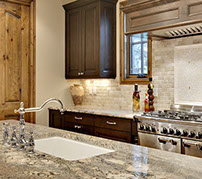
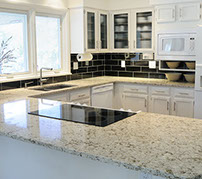
Quartz-Kitchen-Countertop
GRANITE VS. MARBLE COUNTERTOPS
Pros For Granite Vs. Marble Countertops:
Both Granite and Marble are made of genuine natural stone which means each slab is unique and beautiful. Marble is famous for it veining, which has led to the term “marbling.” Marble also ages beautifully. Granite and marble comes in a large variety of colors and the options and patterns are endless.
Cons For Granite Vs. Marble Countertops:
Marble is more porous and should have a quality sealer to reduce staining. Because the minerals that compose marble are sensitive to certain chemical agents, it is important to wipe spills away quickly. Anything acidic will leave an etch mark if left on the stone for too long. Marble needs to be cared for in the same manner a fine piece of wood is cared for.
Homeowners have many choices when it comes to building materials for kitchens, baths, outdoor spaces, bars, and other rooms in the house. There are many factors to consider when looking at countertop options, including your specific needs and personal design tastes, as well as characteristics like strength, maintenance, the price tag, and longevity. We’ve provided this comparison guide on granite versus marble to assist you as you’re making choices for your home renovation projects.
Granite
Granite Pros:
Granite is an ideal option for homeowners looking for strength and durability, with the timeless elegance of a natural building material. With proper cleaning and regular application of a suitable sealant, it can handle normal wear and tear, and is resistant to scratches and stains. Granite countertops are also highly resilient when exposed to high heat, so it’s suitable for installation near the cooktop or in a bathroom where hair appliances are used. While it’s a natural product, granite is available in a range of colors and textures. Every slab is unique, appealing to those seeking a high-end, individual look.
Granite Cons:
The uniqueness of granite that some find attractive may not suit the personal tastes of homeowners looking for a modern, contemporary look. Though granite is extremely strong, it’s also quite porous: Application of a sealant is necessary to protect against stains, etching, and bacteria. Plus, cost may be an issue for a renovation budget. Granite ranks at the top with other natural building materials. In some cases, due to the weight of the material, special structures must be placed to support granite surfaces.
Marble
Marble Pros:
If you’re looking for spectacular, sophisticated appeal, a marble countertop may be the right choice for you. It’s an igneous stone, meaning that it derives from solidified lava, so marble offers a stunning display of color – from classic neutrals to shades of rose, gold, gray, sage, and yellow. For applications where high heat will be present, marble is resistant and stands up to pots and pans. Many homeowners choose it for fireplace surrounds because it won’t discolor over time.
Marble Cons:
You may have concerns about installing marble due to its porous nature; it’s even more porous than granite and will absorb liquids, so oil, wine, juices, and acids will penetrate quickly. The stains can be difficult, if not impossible, to remove. There are sealants that can prevent liquids from absorbing, but it’s necessary to apply upon installation and every year or so. While marble is quite durable, it may not work well in busy kitchens where it can be scratched by knives or chipped by heavy pots.
Contact Alaska’s Leading Supplier of Granite and Marble
Our team of designers at North Coast Countertops can help you as you compare granite and marble for projects involving countertops, sinks, and other household surfaces. Visit our showroom to see our huge selection of premium quality building materials for all your home renovation needs. You can also check out our countertop design gallery to see samples of our granite, marble, quartz, and other products, or give us a call to request a quote.


Quartz-Kitchen-Countertop
Granite-Kitchen-Countertop
CORIAN VS. GRANITE COUNTERTOPS
Pros For Corian Vs. Granite Countertops:
Corian is man-made and created by combining minerals and acrylics. Corian offers more accessories such as integrated sinks and coved backsplashes. Both come in a wide variety of colors. Corian is easier to get in specific colors than granite. Corian and granite are comparable in the cost of the original installation.
Cons For Corian Vs. Granite Countertops:
Granite offers many more pros than Corian in that fact that it is heat, stain, scratch and chemical resistant. Granite also requires less maintenance then Corian and other solid surface materials. Cracks and scratches are inevitable in Corian and though they can be repaired Corian can also become damaged if exposed to heat. Corian slabs are 30″ wide, so if you have a wide island or peninsula, or an usual shape (id. boomerang), it will require more seams than granite or quartz surfacing. The seams are inconspicuous but not invisible.
With all the building material options available for kitchens, baths, exterior spaces, fireplaces, and bars, homeowners may have a difficult time choosing the best fit for a building material. You must consider functionality and your personal design style, as well as your needs for durability, easy care, budgeting, and maintenance. This comparison guide on Corian versus Granite should be useful as you’re narrowing down your choices for countertops, sinks, and other surfaces.
Corian
Corian (which is a brand of ‘solid surface’) is man-made and created by combining minerals and acrylics. Granite is a hard and granular igneous rock consisting mainly of quartz, mica, and feldspar. Slabs are mined from the earth and the cut and polished before used the home. Corian and granite are comparable in the cost of the original installation.
Corian Pros:
Because it’s a manufactured material, Corian offers more options for color, texture, and design than any other product; it can even be engineered with a granite or marble effect finish that stays true even when viewed at close range. Plus, Corian can be produced in large sheets to avoid the seams that some homeowners find unattractive. It’s easy to clean with a mild detergent and water, and very resistant to stains. Corian’s cost is also a pro for anyone on a tight renovation budget, as it’s affordably priced and will last for years.
Corian Cons:
The primary downside of Corian is that it’s not as durable as compared to granite, and can be scorched if exposed to hot pans or flames in the kitchen. It cannot be used as a cutting surface, due to its construction out of plastic resins. Corian is also not the best choice for bathrooms where it may come into contact with hot hair appliances. Cracks and scratches are inevitable in Corian and though they can be repaired, its often expensive.
Corian slabs are only 30″ wide, so if you have a wide island or peninsula, or an usual shape (id. boomerang), it will require more seams than granite or quartz surfacing. The seams are inconspicuous but not invisible.
Granite
Granite Pros:
This building material is popular with homeowners seeking the richness and classic appeal that can only come from a natural product. Granite slabs are available in a range of colors and textures for unmatched elegance. It’s also extremely hard and heat resistant, so granite is ideal for kitchens and bathrooms where it may be exposed to hot pots, pans, and appliances. In kitchens, granite is a proven winner because it will withstand scratches and stains, and will stay looking brand new even after years of wear and tear.
Granite Cons:
One caveat of granite’s durability is that it requires maintenance to overcome its porous characteristics, however the maintenance is still less than required of Corian. Granite requires sealing at installation, and frequently thereafter to protect against stains and etching. The surface porousness can also allow bacteria to build up if the sealant isn’t applied regularly. In addition, granite may not the be the right fit for modern interior or exterior design styles. As a natural material, each slab is unique, which puts it at odds with the clean lines of contemporary décor. Cost may also be a factor if you’re considering granite.
Contact Michigan’s Leader of Natural Stone Countertops
At Great Lakes Granite & Marble, our design team is here to help you compare Corian and Granite, and can provide more information on all our building materials. Stop by and check out our showroom to view our huge collection of products for your home renovation projects. You can also visit our online portfolio for design ideas and other products, or give us a call to request a quote.

Quartz-Kitchen-Countertop
Granite-Kitchen-Countertop
